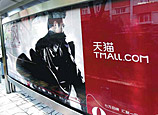
Microsoft officially launched its flagship online store Tuesday on Tmall, China's largest business-to-consumer platform, a move to expand its tablet computer and smartphone sales in the world's second largest e-commerce market after the US.
More than 50 products are currently available from the new flagship store on tmall.com, including Microsoft's Surface RT tablets and smartphones from its key OEM partners such as Nokia.
The new store serves as a complementary extension to the Microsoft Store, the US software giant's self-developed e-commerce website launched in China in October last year, according to a statement sent to the Global Times Tuesday by Alibaba Group.
Tmall is a wholly owned subsidiary of Alibaba Group.
The online store is directly operated by a dedicated team in China which will oversee merchandising, offers, and promotions based on local consumer needs and preferences, the statement said.
"Microsoft sees great potential in China's e-commerce market to offer customers across the country choice, value and service through our online store," Kevin Eagan, vice president of e-commerce for Microsoft Retail Stores, said in the statement.
Zhang Yong, president of Tmall, noted that the collaboration allows Microsoft to fully integrate marketing and sales strategies and connect even more directly and effectively with consumers.
Analysts said the move shows Microsoft is making progress on its localization strategy in the Chinese market. Microsoft partnered with Suning, the country's largest home appliance retailer, last October to sell Surface devices through Suning outlets both online and offline.
"Although it will pay a commission fee to Tmall, Microsoft is optimistic about the high customer traffic on the e-commerce platform and hopes the cooperation will boost its sales revenue," Feng Lin, a researcher at China e-Business Research Center, told the Global Times Tuesday.
In contrast to Microsoft, Apple Inc has chosen to develop its own online store rather than launch flagship stores on Tmall or other online retailers.
"Apple's products have a dominant market share in China, so it does not have an urgent need to cooperate with domestic online retailers and share the profit with them," Lu Zhenwang, CEO of Shanghai Wanqing Commerce Consulting, told the Global Times Tuesday.
About 30,000 Surface RT tablets were sold in China in the fourth quarter of 2012, accounting for only 1 percent of the country's tablet computer market, according to data from IT consultancy IDC.
Meanwhile, Apple's iPads grabbed a 62 percent share with 1.4 million shipments during the period, the data showed.
"Expanding sales channels can't help Microsoft beat Apple or Samsung," Lu said. "Microsoft needs to pick up the pace in product design if it wants to compete with other tablet makers."
















 Villagers express condolence to death of retired CPC chief of Huaxi Village
Villagers express condolence to death of retired CPC chief of Huaxi Village


![]()
